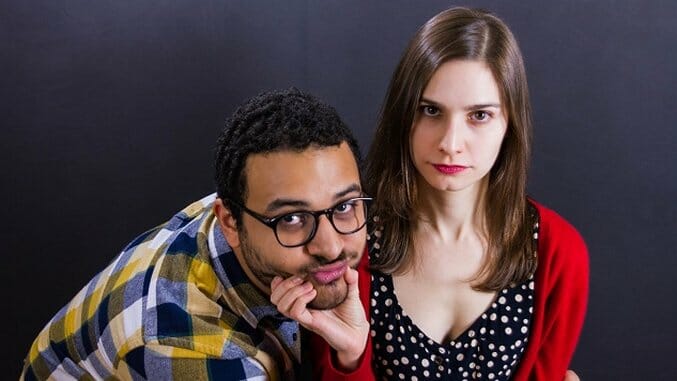Marina and Nicco: Unpacking Sketch Comedy with Their New York Residency

A slow waltz of a play, Unpacking: A Ghost Story Told in the Dark opens in figurative and literal light. To the tinkling of piano keys, we witness an Up-like montage of a couple’s honeymoon phase: they meet, first digitally (by swiping right) and then in person, pantomime their way through the usual new-couple activities, meet each other’s friends, and—as time slows to its normal pace—move in together. It’s a happy sequence, all smiles and cheery music, tinged by the grim knowledge that rarely in art does joy come without sorrow nipping at its heels. Then there’s the promise in that title—ghosts, darkness, and the unavoidable discord that comes of unzipping another human being and peering in. The rest of the play, written by Marina Tempelsman and Nicco Aeed as part of their 6-month residency at the People’s Improv Theater in New York, delivers all of these, though not quite as you’ve seen them before. In fact, in Unpacking, you may not see them at all.
Many comedians are satisfied simply to write and perform funny things, and we have them to thank for some of the genre’s greatest works. Fewer comedians show as much interest in the form their content takes, though I suspect this number is increasing with the influence of high-profile auteurs like Louis C.K. and Eugene Mirman. Count Tempelsman and Aeed, who make comedy under the moniker Marina and Nicco, among these ranks. They gave Unpacking a simple but crucial twist: on the couple’s first night in their new home, the lights go out. So do the lights in the PIT’s Striker Stage. In the absence of traditional illumination, it falls to the audience, armed with flashlights, to make visible the play’s seven characters—the central couple and the specters of their past. This is often a frustrating effect, as the democratization of formal decision-making equates to wrong-headed decisions (a well-lit character in what logically must be a shadowy corner) as often as it equates to no decision at all (a congregation of listless beams hovering on the back wall). But the overwhelming atmosphere is a poignant one, a sense of shattering uncertainty in spite and because of great agency: I have this flashlight, this newfound power, this nascent relationship, this new home—and not the damndest clue what to do with any of it.
“We didn’t want it to be a gimmick,” Tempelsman reflected, on a recent and unseasonably warm March afternoon. She and Aeed had just wrapped up Unpacking’s three-night run and were in rehearsals for the third play in their residency, Role Play, in which two actors will play a range of characters involved in a love affair. “It’s a play about intimacy and seeing things subjectively,” she said, “and I think it all came together really nicely.” The idea for the device was hers, though Aeed has long been interested in the artifice of light in theatre—he recalls a production of Hamlet in which the opening scene was lit only by a flashlight. But both writers (actors, directors) are deeply concerned with form, be it in the web sketches they’ve made for Funny or Die, their live sketch work, or the plays they’re writing for the PIT. “We generally like writing something for the medium it’s gonna be in,” Aeed said. “If you’re gonna see something live, it should be worth seeing live. I was surprised how well [Unpacking] worked—the way people’s flashlights bounced and moved felt a little bit underwater. It made the whole thing seem a little dreamlike, which helped you understand the ghost-iness of it.”
-

-

-

-

-

-

-

-

-

-

-

-

-

-

-

-

-

-

-

-

-

-

-

-

-

-

-

-

-

-

-

-

-

-

-

-

-

-

-

-









































